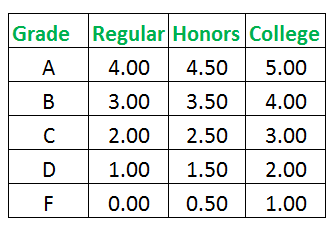Raising the stakes

How difficult the class is decides the GPA scale
Everyone knows that when it comes to school, grades are an important thing. The grade someone has determines how well they are doing in any certain class. Colleges tend to look at a student’s grades and/or GPA to determine how well they are doing in their courses, and if they are the right student for their school.
A high school GPA can be measured on either an unweighted or weighted scale. The main difference between the two is that weighted GPAs take into account the difficulty of the classes and unweighted GPAs do not. Most unweighted GPAs are recorded on a scale of 0 to 4.0, and most weighted GPAs are recorded on a scale of 0 to 5.0. For someone who is taking advanced classes, weighted GPAs would put them on a higher scale than those in regular classes, setting them to a different standard. This way, advanced and regular courses are not counted as equals.
Many schools do not do this, whether it be because they disagree with it, or because they are simply too lazy to figure which classes are worth what.
When asked why Baldwin High School does not, Student Counselor Autumn Weiss said there were a couple of reasons.
“The school board has never approved having a weighted GPA,” Weiss explained, “and often times when I am asked what a student’s GPA is on applications if it is weighted the college asks us to provide it to them unweighted.”
Another reason would be the topic of valedictorian.
“Weighted grades would be useful if we had a valedictorian and had to choose one person as the top of the class, but we don’t,” Weiss explained.
These are some valid excuses as to why BHS does not use weighted grades, but what about schools that do have class rank and a valedictorian? Say someone who was in an advanced math class had the overall grade of an B, but someone in the regular math class had an A. In an unweighted GPA system, the student taking the regular class would have a higher GPA than the other, even though one student is taking a harder, more advanced class. This affects their class rank. The difference between having an unweighted or weighted GPA, could be the difference between being in the top 20 percent of your class, or the top 10 percent, which can decide which scholarships one may receive.
Many students find it more important, and a higher priority that they make straight A’s, instead of challenging themselves. Some, would rather take a regular course, even if they are smart enough to take the advanced one, for the sole reason of receiving an A in that class, instead of say a B in the advanced one. According to James Keipp, the director UCLA’s AP Readiness Program, advanced classes have on average 30% more work than regular classes. Schools with unweighted GPAs are not giving honors students the credit they deserve and work so hard for.
If all schools began to use a grading system with a weighted scale, not only would it give honors students their rightful chances in receiving scholarships that require a certain GPA or class rank, but it would also give them the proper credit for the amount of work they do. Using weighted GPAs would not hurt the grades of students in regular classes, other than putting students taking advanced classes above them on class rank. In addition, using weighted GPAs would encourage students, that might have been too focused on getting a 4.0 before, to take more challenging classes without the fear of lowering their GPA, and instead having the opportunity to raise it.

